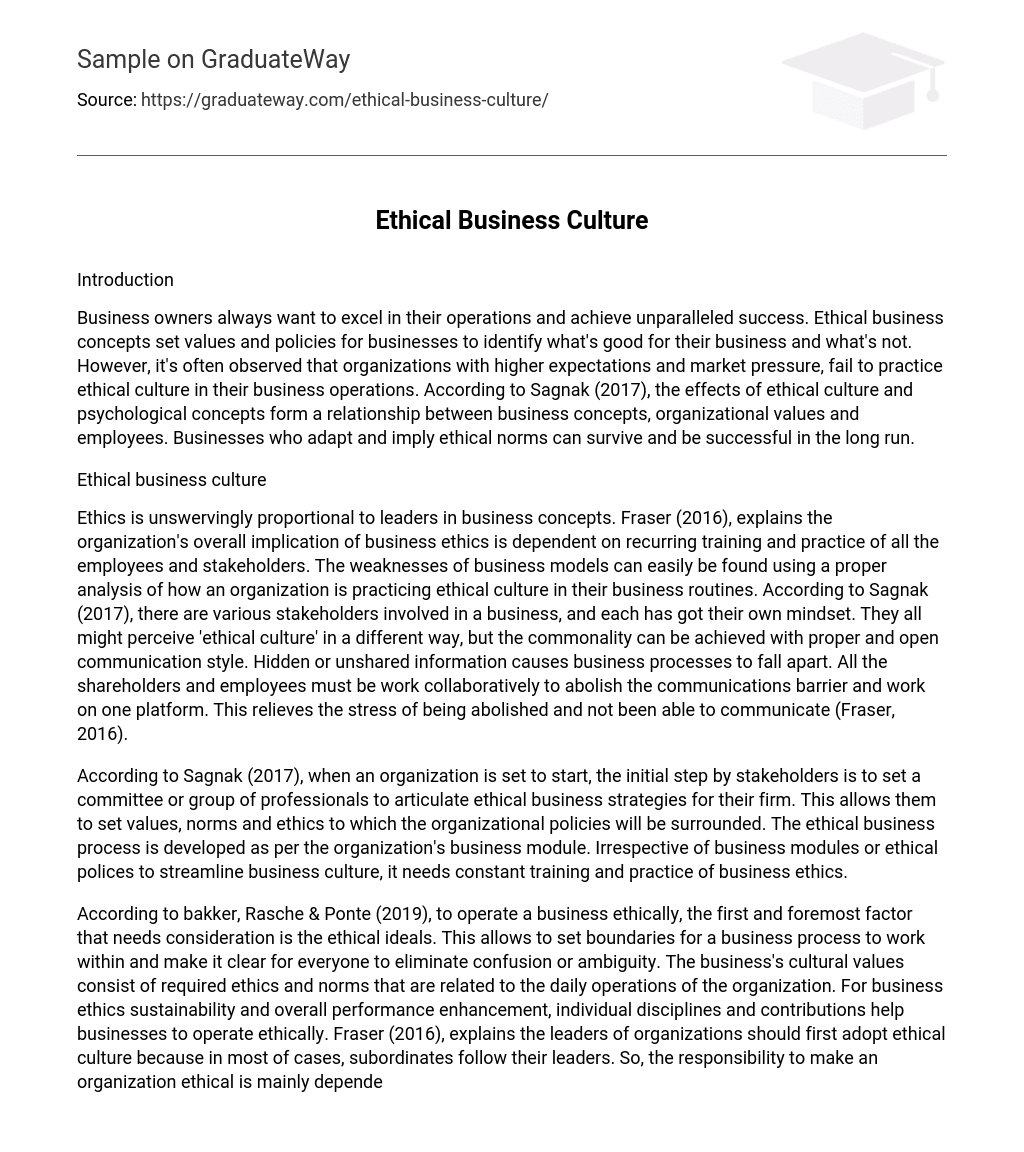Introduction
Business owners always want to excel in their operations and achieve unparalleled success. Ethical business concepts set values and policies for businesses to identify what’s good for their business and what’s not. However, it’s often observed that organizations with higher expectations and market pressure, fail to practice ethical culture in their business operations. According to Sagnak (2017), the effects of ethical culture and psychological concepts form a relationship between business concepts, organizational values and employees. Businesses who adapt and imply ethical norms can survive and be successful in the long run.
Ethical business culture
Ethics is unswervingly proportional to leaders in business concepts. Fraser (2016), explains the organization’s overall implication of business ethics is dependent on recurring training and practice of all the employees and stakeholders. The weaknesses of business models can easily be found using a proper analysis of how an organization is practicing ethical culture in their business routines. According to Sagnak (2017), there are various stakeholders involved in a business, and each has got their own mindset. They all might perceive ‘ethical culture’ in a different way, but the commonality can be achieved with proper and open communication style. Hidden or unshared information causes business processes to fall apart. All the shareholders and employees must be work collaboratively to abolish the communications barrier and work on one platform. This relieves the stress of being abolished and not been able to communicate (Fraser, 2016).
According to Sagnak (2017), when an organization is set to start, the initial step by stakeholders is to set a committee or group of professionals to articulate ethical business strategies for their firm. This allows them to set values, norms and ethics to which the organizational policies will be surrounded. The ethical business process is developed as per the organization’s business module. Irrespective of business modules or ethical polices to streamline business culture, it needs constant training and practice of business ethics.
According to bakker, Rasche & Ponte (2019), to operate a business ethically, the first and foremost factor that needs consideration is the ethical ideals. This allows to set boundaries for a business process to work within and make it clear for everyone to eliminate confusion or ambiguity. The business’s cultural values consist of required ethics and norms that are related to the daily operations of the organization. For business ethics sustainability and overall performance enhancement, individual disciplines and contributions help businesses to operate ethically. Fraser (2016), explains the leaders of organizations should first adopt ethical culture because in most of cases, subordinates follow their leaders. So, the responsibility to make an organization ethical is mainly dependent on leaders.
Conclusion
Ethical business culture is an important aspect of organizational ethics and requires employees to practice it. This sets norms for an organization to operate ethically. Employees’ involvement in designing values and norms for an organization creates a positive impact. By doing so, it becomes eventual for everyone to practice ethics in their work. The implications for a good business environment demand positive behavior and collaboration among employees and shareholders. Employee’s work appreciation and recognition paves a way to make them trustworthy and resourceful for the organization.
References
- de Bakker, F. G. A., Rasche, A., & Ponte, S. (2019). Multi-Stakeholder Initiatives on Sustainability: A Cross-Disciplinary Review and Research Agenda for Business Ethics. Business Ethics Quarterly, 29(3), 343-383. DOI: org/10.1017/beq.2019.10
- Fraser, A. D. E. (2016). A Case Study in Utilizing an Ethical Climate Survey for Creating and Maintaining an Ethical Organizational Culture. Journal of Behavioral & Social Sciences, 3(4), 183-189
- Sagnak, M. (2017). Ethical Leadership and Teachers’ Voice Behavior: The Mediating Roles of Ethical Culture and Psychological Safety. Educational Sciences: Theory and Practice, 17(4), 1101-1117





